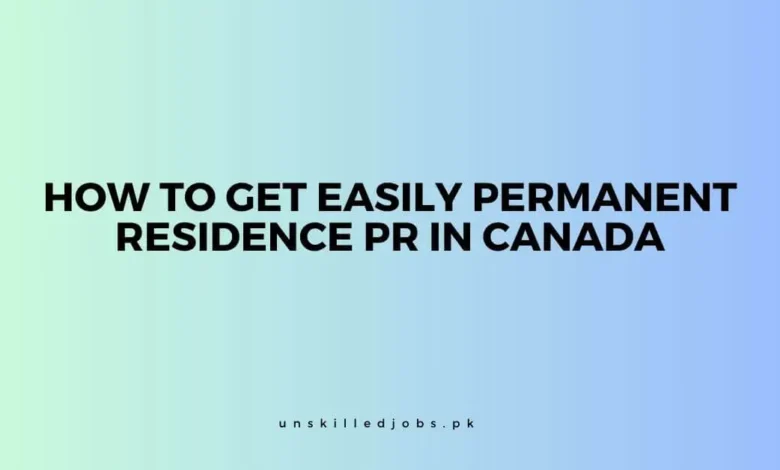How to Get Easily Permanent Residence PR in Canada

People come to Canada from all over the world to live because it is known for being friendly and having a lot of different cultures. Permanent Residence (PR) is one of the most sought-after positions in Canada. It lets people live and work in the country forever. With PR status, you can get access to social services, healthcare, and education, and you can also apply to become a Canadian citizen. This blog post will talk about the different ways to easily get permanent residence in Canada and the requirements that people who want to do this must meet.
There is a lot of competition to get PR status in Canada because the country gets a lot of applications every year. The Canadian government has strict requirements that applicants must meet in order to be eligible. These include having a certain level of schooling, work experience, language skills, and the minimum number of points needed on the Comprehensive Ranking System (CRS). Learning about the application process and what you need to do can be difficult, but it is possible to get through it with the right help and advice. In the parts that follow, we’ll talk about the different ways to get PR status in Canada, along with the steps that are needed for each one.
What is a Canada PR visa?
- It has to do with the law: With a Canada PR visa, a person can legally live, work, and go to school in Canada for the rest of their life.
- It has a lot of advantages: people with a PR visa have almost all the same rights and benefits as Canadian citizens. For example, they can get health care, social services, and schooling.
- It can lead to becoming a citizen: People with a PR visa can apply for Canadian citizenship, which gives them more perks and rights after a certain amount of time has passed.
What are the Canada PR Requirements?
- Age: People who want to apply must be at least 18 years old.
- Language Skills: Applicants must show that they can speak English or French well by taking an official language test.
- Education: Applicants must have at least a high school diploma or the equivalent from a recognized school.
- Applicants must have a certain amount of work experience in a skilled job. The National Occupational Classification (NOC) system defines this experience.
- Health and Character: Applicants must pass a medical test and show proof that they have never been in trouble with the law.
- Lack of Money: Applicants must show that they have enough money to support themselves and their family in Canada.
- Points System: Applicants must get a certain number of points on the Comprehensive Ranking System (CRS), which is based on things like age, schooling, language skills, work experience, and more.
- Admittance: People who want to come to Canada must be able to do so and not pose a security risk or a threat to Canadians’ health and safety.
What are the Ways to get Easily Permanent Residence PR in Canada?
- Program for Express Entry (For Professionals and Trade Workers)
- Provincial Nomination Program (for people who didn’t meet the requirements for Express Entry)
- Business Investor Program (with an initial payment of at least CAD$150,000)
- With an LMIA from a Canadian employer, you can get a work permit.
- Get a study visa (for college students or fresh graduates)
- Visitor Visa (will change to LMIA when you get to Canada)
- Prospective Immigrant Program for the Atlantic
1# Express Entry Program:
The Express Entry Program is a government program that helps skilled workers who want to move to Canada get the papers they need based on their age, education, work experience, and language skills. Candidates fill out an online resume, and then they are ranked by how many points they get. The candidates with the highest scores are asked to apply for permanent residence in Canada.
2# Provincial Nomination Programme (PNP):
The PNP is a program that lets provinces and regions in Canada choose who can live there permanently based on the needs of their own job markets. The PNP is different for each province, and people who meet the standards for that province can use it to apply for permanent residence.
3# Business Investor Program:
People who want to start a business or invest in one in Canada can use the Business Investor Program. Candidates must meet certain requirements about their business knowledge, net worth, and the amount of money they are willing to invest. Candidates can get legal residence in Canada if they are accepted.
4# Work Permit:
People with a work pass can work in Canada for a certain company for a set amount of time. Work permits can be given out if someone offers you a job, if there are foreign agreements, or if you work in a certain industry, like entertainment or farming.
5# Study Visa:
With a study visa, international students can go to a Canadian school and learn. Those who want to apply must have been accepted to a school in Canada and show proof that they have enough money to live on. For people who want to study for free in Canada, here are the University of Alberta Scholarships 2024–25.
6# Visitor Visa:
People can only visit Canada for a certain amount of time with a visitor ticket. Those who want to come to Canada must show that they have ties to their home country and will return after their visit. They must also show that they have enough money to live on while they are there.
7# Atlantic Immigration Nominee Program (AIP):
There is a PNP called the Atlantic Islands Partnership (AIP) that only works in Nova Scotia, New Brunswick, Newfoundland and Labrador, and Prince Edward Island. People who want to apply must have a job offer from a company in one of the Atlantic provinces and meet other standards about their education, work experience, and language skills. Candidates can get legal residence in Canada if they are accepted.
What is the Step by Step Process for Canada PR Visa?
1) Determine Eligibility:
The first step is to find out if you can join the Express Entry program. There are age, education, work experience, and language standards that candidates must meet. To see if they are eligible, candidates can use a free online testing tool.
2# Take Language Tests:
English candidates must take the IELTS or CELPIP, and French candidates must take the TEF to show that they can speak and write the language well.
3# Create an Express Entry profile:
Through the Express Entry system, people who are qualified for the program can make an online profile. People who want to apply will have to give personal information, work history, school records, language test scores, and other information.
4# Receive an invitation to Apply:
An invitation to apply (ITA) for permanent residence is sent to the candidates with the best scores in the Express Entry pool. People who get an ITA have 60 days to send in a full application.
5# Submit a complete application:
People who want to live in the country permanently must fill out an application and include supporting papers like police certificates, medical exams, school transcripts, and proof of funds. People who want to apply must also pay a fee.
6# Wait for a decision:
The time it takes to finish an application for a Canada PR visa varies, but it usually takes a few months. Online, applicants can see what’s going on with their application.
7# Receive a Confirmation of Permanent Residence (COPR):
Those who apply will get a COPR if their entry is accepted. With this paper, they can come to Canada and live there permanently.
8# Land in Canada:
As soon as people get the COPR, they have a certain amount of time to become permanent residents of Canada. In order to become a permanent resident of Canada, people must show their COPR and other papers at the port of entry.
Conclusion:
Check out the different ways to get permanent residence (PR) in Canada, like the Atlantic Immigration Nominee Program (AIP), the Business Investor Program, the Express Entry Program, and the Provincial Nomination Program (PNP). Learn about the requirements, language tests, application process, and perks of getting permanent residence in Canada.
People Also Ask
-
What is a Canada PR visa, and what are its benefits?
People with a Canada PR visa can legally live, work, and go to school in Canada for as long as they want. Access to health care, social services, schooling, and the chance to apply for Canadian citizenship are some of the benefits.
-
What are the requirements for Canada PR?
Age, education (at least a high school diploma or the equivalent), work experience in a skilled job, health, character, financial stability, and points on the Comprehensive Ranking System (CRS) are some of the things that applicants must satisfy.




